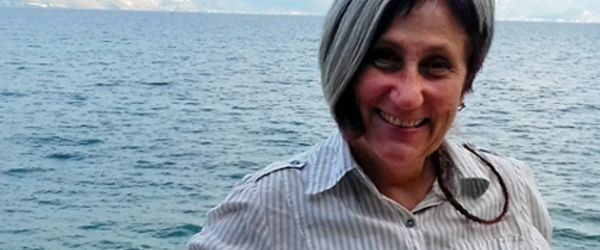
Her discipleship journey started with ABC
By L.J. in Macedeonia — In the summer of 2013, students from Lancaster Bible College came to Macedonia for an English outreach. After the first night of classes, we gathered the students together to go out for a coffee or ice cream. I really connected with one of two ladies who was about my age — Vesna — and we sat down at the café to talk.
Now it’s not that uncommon for the talk to quickly turn to spiritual topics in Macedonia, because Macedonians love to talk about everything. So I wasn’t too surprised when during our conversation, even though I didn’t know Vesna, she started asking me about my faith and what I believe. I left that evening thinking, this is a friendship I want to continue. So we got together for coffee, lots of coffee, lots of long conversations.
After the English class ended, I invited Vesna to a Wednesday night Bible study that our team was holding at our church plant. She agreed to come, and she upped it — she not only kept coming back, she invited her son and one of her daughters to come, too.
Vesna had a lot of knowledge about God. Her grandfather had been an Orthodox priest, so she had grown up in and around the Orthodox church, but she had no idea what a relationship with Jesus Christ was. And, to be honest, her life was a mess. She had a fiery temper, a short fuse and a sharp tongue. She had recently divorced her husband of 20 years, and she had been struggling with some entangling sins.
But at our church fellowship, she really felt cared for and loved and prayed for, and she just kept coming back. The more she learned about Jesus, the more she trusted him. The more she got involved in our fellowship, the more she grew to appreciate and love the family of God, and she didn’t want to live her life apart from it. The more she got into God’s Word, the more she became aware of her sin — and she would confess to God and she would confess to all of us. She was very open!
Our family went away for a year of home service, and when we came back, I was able to see Vesna face-to-face, to really see how she was doing. Her life wasn’t perfect, but she had changed. The Lord was transforming her life. She was starting to be bolder in sharing her faith with co-workers and family members. And people were noticing a difference.
Later that fall, she was hungry for more of the Word, so she and I started attending a deeper Bible study. On the second Saturday of every month, she would sit with a small group of other Macedonian women, and she could see Christ lived out in their lives. And it was important that this was in Macedonian women’s lives, not just in my life as an American. I saw her temper and her sharp tongue start to come under the control of the Holy Spirit.
It seemed like every Saturday when we had this Bible study, a crisis would erupt in Vesna’s family — but somehow the Lord would pave the way for her to come. So we continued to grow together.
As a child, Vesna had been baptized in the Orthodox church. These last few years, she had said, “I don’t see the need to get baptized again. I don’t really see the point.” But in the last couple of months, our church plants had been coming together to plan our annual baptism service by the river, so baptism was a subject of discussion. Vesna started asking more questions this year, and it was an incredible joy for us that this summer — four years after we met — Vesna publicly declared her faith in Christ through baptism.
Vesna’s discipleship journey took her from English class to friendly chats to Bible study to joining a church to baptism — and now she’s taken another amazing step: In the last couple of weeks, after lots of prayer and planning and overcoming obstacles, Vesna has begun to lead an evangelistic Bible study for women in our neighborhood! It’s so neat to see this disciple reaching out to make other disciples!
Additional Posts





